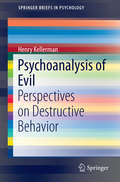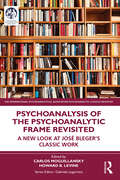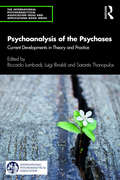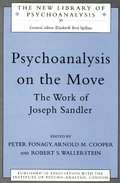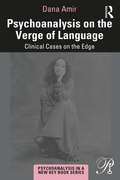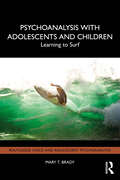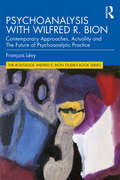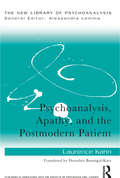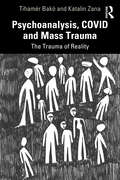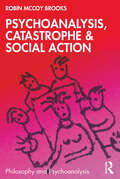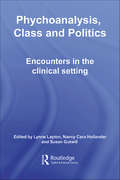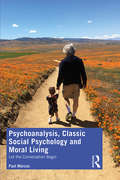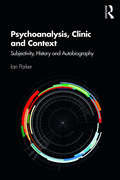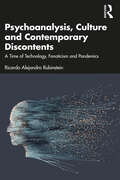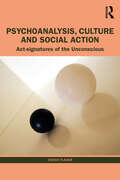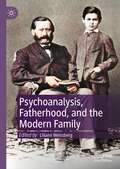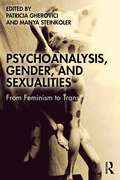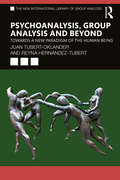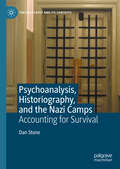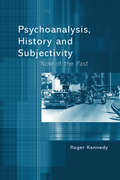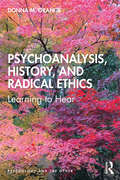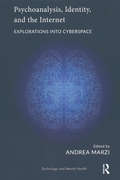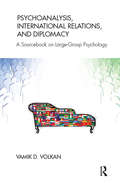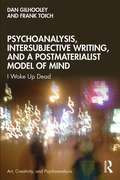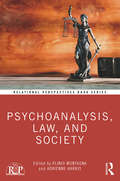- Table View
- List View
Psychoanalysis of Evil
by Henry KellermanFor all our knowledge of psychopathology and sociopathology--and despite endless examinations of abuse and torture, mass murder and genocide--we still don't have a real handle on why evil exists, where it derives from, or why it is so ubiquitous. A compelling synthesis of diverse schools of thought, Psychoanalysis of Evil identifies the mental infrastructure of evil and deciphers its path from vile intent to malignant deeds. Evil is defined as manufactured in the psyche: the acting out of repressed wishes stemming from a toxic mix of harmful early experiences such as abuse and neglect, profound anger, negative personality factors, and mechanisms such as projection. This analysis brings startling clarity to seemingly familiar territory, that is, persons and events widely perceived as evil. Strongly implied in this far-reaching understanding is a call for more accurate forms of intervention and prevention as the author: Reviews representations of evil from theological, philosophical, and psychoanalytic sources. Locates the construction of evil in psychodynamic aspects of the psyche. Translates vague abstractions of evil into recognizable concepts. Exemplifies this theory with the lives and atrocities of Hitler and Stalin. Applies psychoanalytic perspective to the genocides in Turkey, Pakistan, Cambodia, and Rwanda. Revisits Hannah Arendt's concept of "the banality of evil. " Psychoanalysis of Evil holds a unique position in the literature and will gather considerable interest among readers in social psychology, psychoanalysis, sociology, and political anthropology. Historians of mass conflict should find it instructive as well.
Psychoanalysis of the Psychoanalytic Frame Revisited: A New Look at José Bleger’s Classic Work (The International Psychoanalytical Association Psychoanalytic Classics Revisited)
by Carlos MoguillanskyPsychoanalysis of the Psychoanalytic Frame Revisited provides an in-depth discussion of José Bleger’s work, broadening current knowledge and focusing on his significant contribution to psychoanalytic thinking. This work should prove especially relevant in considering the implications of changes in the treatment setting forced by the Covid pandemic. This edited collection proposes a current debate on José Bleger's ideas on the psychoanalytic setting. The contributors here provide a broad overview of current discussions about the analytic setting, its clinical expressions and its technical management, engaging and transforming the concept of "encuadre" (frame). The book covers topics including early experiences, the psychoanalytic setting, symbiosis and applications in a pandemic. A common thread, Bleger's brilliant intuition, runs through the book, and the tense relationship between the frame and the figure maintains its dynamics throughout. Psychoanalysis of the Psychoanalytic Frame Revisited will be of great interest to psychoanalysts in practice and in training, as well as anyone seeking to understand the work of José Bleger.
Psychoanalysis of the Psychoses: Current Developments in Theory and Practice (The International Psychoanalytical Association Psychoanalytic Ideas and Applications Series)
by Riccardo Lombardi Luigi Rinaldi Sarantis ThanopulosPsychoanalysis of the Psychoses brings together a distinguished international set of contributors, offering a range of views and approaches, to explore the latest thinking in the psychoanalytic treatment of psychosis and related disorders. Drawing on findings from neuroscience, theory and clinical material from many schools of psychoanalytic thought, this book offers a comprehensive guide to understanding how psychosis is conceptualised from a psychoanalytic perspective. It looks at how to work with psychotic patients, typical problems in treating psychosis and the role of pharmacology. It demonstrates the relational dimension, capable of strengthening the patient’s observing Ego and facilitating the integration of the different areas of the personality. This process can identify and work through the main psychological stress factors involved in psychotic disturbances, transforming chaotic thoughts into springboards for important insights, and offering patients the precious chance to construct for the first time a creative relationship with their own existence. Psychoanalysis of the Psychoses will be of great interest to psychoanalysts and psychoanalytic psychotherapists as well as psychiatrists wishing to draw upon psychoanalytic ideas in their work.
Psychoanalysis on the Move: The Work of Joseph Sandler (The New Library of Psychoanalysis #Vol. 35)
by Peter Fonagy Arnold M. Cooper Robert S. WallersteinPeter Fonagy Winner of the 2010 Sigourney Award! Joseph Sandler has been an important influence in psychoanalysis throughout the world during the latter part of the twentieth century, contributing to changing views on both psychoanalytic theory and technique. He has also been a bridging force in psychoanalysis, helping to close the gap between American ego psychologists, and British Kleinian and object relations theorists. Psychoanalysis on the Move provides a comprehensive and accessible overview of Sandler's contribution to the development of psychoanalysis. The contributors trace the development of the main themes and achievements of Sandler's work, in particular his focus on combining psychoanalytic theory and clinical practice. Timely and important, Psychoanalysis on the Move should make interesting reading for psychoanalysts, psychotherapists, and all those who wish to know more about one of the most creative figures in psychoanalysis of the past few decades.
Psychoanalysis on the Verge of Language: Clinical Cases on the Edge (Psychoanalysis in a New Key Book Series)
by Dana AmirThis book examines the importance of language and writing in psychoanalytic theory and practice, offering an understanding of how language works can give a deeper insight into the psyche both in clinical practice and everyday life. Bringing together psychoanalytic insights that hinge on the language of "difficult cases", this collection also includes contributions dedicated to meta-study of psychoanalytic writing. The first chapter shows how music includes tonal regions that deploy existing rules and syntax, alongside atonal ones dominated by caesuras, pauses, and tensions. The second chapter discusses the malignant ambiguity of revealing and concealing typical of incestuous situations, pinpointing how the ambiguous language of incest "deceives by means of the truth,". The third chapter brings in Virginia Woolf’s character Orlando in order to illustrate two types of gender crossing. Distinctions defined by the linguist Roman Jakobson help in the fourth chapter to offer an integrative description of obsessive-compulsive phenomenon as an interaction between metaphoric and metonymic dimensions, as well as with a third, psychotic dimension. The fifth chapter focuses on what is called the "screen confessions" typical of the perpetrator’s language. George Orwell’s "newspeak" is used here to decipher the specific means by which the perpetrator turns his or her "inner witness" into a blind one. The final chapter uses Roland Barthes’ concepts of "studium" and "punctum" to discuss the limits of psychoanalytic writing. As a whole, this book sets the psychoanalytic importance of language in a wider understanding of how language helps to shape and even create internal as well as the external world. Drawing on insights from psychoanalytic theory and practice, as well as from linguistics and cultural theory, this book will be invaluable for psychoanalysts, psychoanalytic psychotherapists and bibliotherapists, as well as anyone interested in how language forms our reality.
Psychoanalysis with Adolescents and Children: Learning to Surf (Routledge Child and Adolescent Psychoanalysis)
by Mary T. BradyIn Psychoanalysis with Adolescents and Children: Learning to Surf, Mary T. Brady expertly guides the reader through the challenging and vital process of working with young analysands.Brady likens the experience to ‘learning to surf.’ While finding Bion’s metaphor that the analyst must be able to ‘think under fire’ useful, she suggests ‘learning to surf’ is more apt in psychoanalysis with adolescents and children. Drawing on this metaphor throughout the volume, she describes how the adolescent can be potentially upended, injured or even killed by emotional waves too tumultuous to manage. Surfing also evokes the often uneasy but sometimes thrilling balances of adolescence. Using clinical vignettes from her extensive experience in the field, Brady explores how to work with young people experiencing issues such as eating disorders, gender challenges, parental substance abuse and the impact of the COVID-19 pandemic. Drawing on Bionian Field Theory, as well as the work of Donald Winnicott, she explores how analysts can surf with the adolescent or child in navigating the ebb and flow of psychic life and development.This book is essential reading for psychoanalysts and psychotherapists, including psychiatrists, psychologists, therapists and counselors, who treat children and adolescents.
Psychoanalysis with Wilfred R. Bion: Contemporary Approaches, Actuality and The Future of Psychoanalytic Practice (The Routledge Wilfred R. Bion Studies Book Series)
by François LévyPsychoanalysis with Wilfred R. Bion is the product of François Lévy’s efforts over a period of twenty years to represent clearly the classical elements and the innovatory propositions of the thought and work of Bion, who offers both new and modified ways of practising and thinking about the psychoanalytic experience. Bion’s thought, methodical and intuitive, gave rise to profound modifications in the approach to the psychology of groups, clinical work with psychoses, and the conception of the genesis of thought. Some of his original notions – psychic growth, processes of thinking, transformations, alpha function, maternal reverie – constitute valuable tools for rethinking psychoanalytic practice. This book places Bion’s thought within a filiation that is faithful to those of Sigmund Freud and Melanie Klein. It shows the parallels that exist between Bion’s formalisations and those of Lacan. It also lays emphasis on the mechanisms of thought arising from the negative (André Green), from logic (Lewis Carroll), from causalist philosophy (David Hume), from literature (Milton, Blanchot) and from the physical sciences (Stephen Hawking). Finally, Lévy underlines the importance of placing individuals within the collective from which they have originated. Psychoanalysis with Wilfred R. Bion will appeal to psychoanalysts and psychoanalytic psychotherapists looking to draw on the ideas of one of the most important and influential figures in the history of psychoanalysis.
Psychoanalysis, Apathy, and the Postmodern Patient (New Library of Psychoanalysis)
by Laurence KahnThe postmodern turn underlies a new development in psychoanalysis, which has theoretical and practical implications. Psychoanalysis, Apathy, and the Postmodern Patient involves a detailed reading of the main psychoanalytic texts that mark out this extended development, along with a critical examination of the changes in the major Freudian concepts. At stake are the tenets of infantile sexuality, ‘psychic reality,’ unconscious determinism, the fulfilment of unconscious desire, and free association. In this book, Laurence Kahn sets out a critique of postmodern psychoanalysis, via a theoretical and clinical discussion that tackles the place of metapsychology and the question of the scientific status of psychoanalysis. Starting from Freud’s own work, she considers such key topics as the analyst’s objectivity, the relevance of self-disclosure, the complex influence of French postmodern theorists, and the role of empathy in psychoanalytic technique. In so doing, she offers a perspective on psychoanalytic thought and practice that exposes the insidious taming of the Freudian model in favour of a 'humanistic' and 'dialogic' approach that obliterates the radical otherness of the unconscious. Coming from a powerful voice in the contemporary French psychoanalytic tradition, Psychoanalysis, Apathy, and the Postmodern Patient is a bold celebration of psychoanalysis that will be of great interest to psychoanalysts and psychoanalytic psychotherapists, as well as philosophers and historians of thought.
Psychoanalysis, COVID and Mass Trauma: The Trauma of Reality
by Tihamér Bakó Katalin ZanaConstructed as a psychoanalytic diary, the authors of this book reflect on clinical observations from their work with patients during the COVID-19 pandemic, tracking these singular experiences to arrive at broader understanding of the psychological characteristics of collective trauma. Based on the theoretical framework of their previous book, which focuses on the transgenerational, psychological effects of large-scale social-historical traumas and introduced new concepts such as the "Transgenerational Atmosphere," the authors here explore the trauma itself, especially those deep traumas which affect a large group of people or even the whole of humanity, including pandemics, natural disasters, terrorism, and war. In this volume, the authors progress toward the potential immediate and long-term psychological effects of such trauma, including the possibility of the activation of unprocessed transgenerational traumatic experiences, but also the potential for growth. Rich in clinical material and methodological suggestions, this book will appeal to mental health professionals, including psychiatrists, psychologists, psychoanalysts, and social workers, in addition to professors in other academic disciplines such as sociology, history, philosophy, and anthropology.
Psychoanalysis, Catastrophe & Social Action (Philosophy and Psychoanalysis)
by Robin McCoy BrooksThis fascinating volume uses psychoanalytic theory to explore how political subjectivity comes about within the context of global catastrophe, via the emergence of collective individuations through trans-subjectivity. Serving as a jumping-off point to address the structural linkage between collective catastrophe, subject, group, and political transformation, trans-subjectivity is the central tenet of the book, conceptualized as a psyche-social dynamic that initiates social transformation and which may be enhanced in the clinical setting. Each chapter investigates a distinct manifestation of trans-subjectivity in relation to various real-world events as they manifest clinically in the analytic couple and within group processes. The author builds her conceptual arguments through a psyche/social reading of Kristeva’s theory of signifiance (sublimation), Lacan’s 1945 essay on collective logic, Heidegger’s secular reading of the apostle Paul’s Christian revolution, and Žižek, Badiou and Jung’s conception of the neighbor within a differentiated humanity. The book features clinical illustrations, an auto-ethnographic study of the emergence of an AIDS clinic, an accounting of trans-subjectivity in Black revolutionary events in the U.S., and an examination of some expressions of care that arose in response to the COVID-19 pandemic. Psychoanalysis, Catastrophe & Social Action is important reading for psychoanalysts, psycho-dynamic based therapists, psychologists, group therapists, philosophers and political activists.
Psychoanalysis, Class and Politics: Encounters in the Clinical Setting
by Nancy Caro Hollander Lynne Layton Susan GutwillDo political concerns belong in psychodynamic treatment? How do class and politics shape the unconscious? The effects of an increasingly polarized, insecure and threatening world mean that the ideologically enforced split between the political order and personal life is becoming difficult to sustain. This book explores the impact of the social and political domains at the individual level. The contributions included in this volume describe how issues of class and politics, and the intense emotions they engender, emerge in the clinical setting and how psychotherapists can respectfully address them rather than deny their significance. They demonstrate how clinicians need to take into account the complex convergences between psychic and social reality in the clinical setting in order to help their patients understand the anxiety, fear, insecurity and anger caused by the complex relations of class and power. This examination of the psychodynamics of terror and aggression and the unconscious defences employed to deny reality offers powerful insights into the microscopic unconscious ways that ideology is enacted and lived. Psychoanalysis, Class and Politics will be of interest to all mental health professionals interested in improving their understanding of the ideological factors that impede or facilitate critical and engaged citizenship. It has a valuable contribution to make to the psychoanalytic enterprise, as well as to related scholarly and professional disciplines.
Psychoanalysis, Classic Social Psychology and Moral Living: Let the Conversation Begin
by Paul MarcusIn Psychoanalysis, Classic Social Psychology and Moral Living: Let the Conversation Begin, Paul Marcus uniquely draws on psychoanalysis and social psychology to examine what affects the ethical decisions people make in their everyday life. Psychoanalysis traditionally looks at early experiences, concepts and drives which shape how we choose to behave in later life. In contrast, classic social psychology experiments have illustrated how specific situational forces can shape our moral behaviour. In this ground-breaking fusion of psychoanalysis and social psychology, Marcus gives a fresh new perspective to this and demonstrates how, in significant instances, these experimental findings contradict many presumed psychoanalytic ideas and explanations surrounding psychoanalytic moral psychology. Examining classic social psychology experiments, such as Asch’s line judgement studies, Latané and Darley’s bystander studies, Milgram’s obedience studies, Mischel’s Marshmallow Experiment and Zimbardo’s Stanford Prison Experiment, Marcus pulls together insights and understanding from both disciplines, as well as ethics, to begin a conversation and set out a new understanding of how internal and external factors interact to shape our moral decisions and behaviours. Marcus has an international reputation for pushing boundaries of psychoanalytic thinking and, with ethics being an increasingly relevant topic in psychoanalysis and our world, this pioneering work is essential reading for psychoanalysts, psychoanalytic psychotherapists, moral philosophy scholars and social psychologists.
Psychoanalysis, Clinic and Context: Subjectivity, History and Autobiography
by Ian ParkerPsychoanalysis is a strange and mysterious practice. In his new book, Ian Parker offers insights into his own experiences, first as trainee then as analyst, the common assumptions about psychoanalysis which can be so misleading, as well as a map of the key debates in the field today. Beginning with his own history, at first avoiding psychoanalysis before training as a Lacanian, Parker moves on to explore the wider historical development of clinical practice, making an argument for the importance of language, culture and history in this process. The book offers commentary on the key schools of thought, and how they manifest in the practice of psychoanalysis in different regions around the world. Psychoanalysis, Clinic and Context will be of great value to practitioners and social theorists who want to know how psychoanalytic ideas play out in training and the clinic, for trainees and students of psychoanalysis or psychoanalytic psychotherapy, and for the general reader who wants to know what psychoanalysis is and how it works.
Psychoanalysis, Culture and Contemporary Discontents: A Time of Technology, Fanaticism and Pandemics
by Ricardo Alejandro RubinsteinRicardo Rubinstein explores the contemporary culture and its discontents – including subjectivity, fanaticism, panic attacks, technology, and pandemics – through a psychoanalytic lens. Each chapter considers an aspect of modern society and attempts to unpick these complex facets of the world we live in. Psychoanalytic understandings of the triggers and socio-environmental factors of panic attacks, the inner worlds of people attracted to fanatical beliefs and risky behaviors, and our dependence on technology for our most vital activities are explored in an accessible way. Rubinstein also considers the restrictions put in place on the lives of millions of people as a result of the COVID-19 pandemic and examines human adaptation to restrictive conditions. Psychoanalysis, Culture and Contemporary Discontents is illustrated throughout with clinical vignettes from the author’s practice. This psychoanalytic exploration of a diverse range of topical issues will be of interest to psychoanalysts and psychoanalytic psychotherapists in practice and in training. It will also be relevant for academics and students of sociology and cultural studies and to readers interested in understanding cultural concerns in more depth.
Psychoanalysis, Culture and Social Action: Act Signatures of the Unconscious
by Dieter FladerDieter Flader explores how current social and cultural concerns are connected to the unconscious, and how this affects our responses to them. Flader focuses on the role of the ego, assessing how our feelings about these issues in adulthood grow from childhood fears and desires, and integrating the existing psychoanalytic theories of Winnicott, Lacan, Kohut, and others with sociological and political theory. The interdisciplinary approach not only analyses current social issues but also generates new perspectives and solutions, and examines examples including climate change, bullying, and vegetarianism.
Psychoanalysis, Fatherhood, and the Modern Family
by Liliane WeissbergTo what extent are the concepts of fatherhood and family, as proposed by Sigmund Freud, still valid?Psychoanalysis, Fatherhood, and the Modern Family traces the development of Freud’s theory of the Oedipus complex and discusses his ideas in the context of recent psychoanalytic work, new sociological data, and theoretical explorations on gender and diversity. Contributors include representatives from many academic disciplines, as well as practicing psychoanalysts who reflect on their experience with patients. Their exciting essays break new ground in defining who a father is—and what a father may be.
Psychoanalysis, Gender, and Sexualities: From Feminism to Trans*
by Patricia GheroviciTranscending the sex and gender dichotomy, rethinking sexual difference, transgenerational trauma, the decolonization of gender, non-Western identity politics, trans*/feminist debates, embodiment, and queer trans* psychoanalysis, these specially commissioned essays renew our understanding of conventionally held notions of sexual difference. Looking at the intersections between psychoanalysis, feminism, and transgender discourses, these essays think beyond the normative, bi-gender, Oedipal, and phallic premises of classical psychoanalysis while offering new perspectives on gender, sexuality, and sexual difference. From Freud to Lacan, Kristeva, and Laplanche, from misogyny to the #MeToo movement, this collection brings a timely corrective that historicizes our moment and opens up creative debate. Written for professionals, scholars, and students alike, this book will also appeal to psychoanalysts, psychologists, and anyone in the fields of literature, film and media studies, gender studies, cultural studies, and social work who wishes to grapple with the theoretical challenges posed by gender, identity, sexual embodiment, and gender politics.
Psychoanalysis, Group Analysis and Beyond: Towards a New Paradigm of the Human Being (The New International Library of Group Analysis)
by Juan Tubert-Oklander Reyna Hernández-TubertPsychoanalysis, Group Analysis, and Beyond presents an important new paradigm in psychoanalysis and group analysis, presenting the individual and the group as elements of a wider whole and taking socio-political and cultural contexts into account. Juan Tubert-Oklander and Reyna Hernández-Tubert explore the contributions of group analysis to this new perspective, which suggests a holistic conception of the respective status and nature of what the common-sense view of the world conceives as the individual and the community. Part I presents thoughts on the ‘gelding’ of psychoanalysis, focuses on the limitations of classical psychoanalysis, and elaborates on key topics including epistemology, inclusion and exclusion, culture, and the real. Part II considers the reincorporation of what had formerly been excluded, through the theory and practice of group analysis. Finally, Part III bridges the gap, presenting several approaches to the building of the new paradigm that is so sorely needed. Psychoanalysis, Group Analysis, and Beyond will be of great interest to group analysts, psychoanalysts, and psychotherapists in practice and in training, as well as other professionals specializing in group work.
Psychoanalysis, Historiography, and the Nazi Camps: Accounting for Survival (The Holocaust and its Contexts)
by Dan StoneIn the postwar years, Dutch survivors Eddy de Wind, Louis Micheels, and Elie A. Cohen, who went on to become practicing psychoanalysts, penned accounts of their survival of the Nazi camps. Their sober assessments contrast sharply with those by Bruno Bettelheim and Viktor Frankl, which emphasized decisiveness, 'positive thinking', and resistance, missing the fact that many Holocaust victims with those characteristics or other qualities did not survive. De Wind’s, Micheels’ and Cohen’s accounts are more sober, (self-)critical, and shaped by analytical practice. By analyzing them anew and comparing them with accounts by female doctors who survived Block 10 in Auschwitz, this book argues that their theories of survival accord with contemporary sensibilities in psychoanalysis and Holocaust historiography. Psychoanalytic concepts have changed over time in response to greater understanding of the Holocaust and recent Holocaust historiography makes us more receptive to insights that were unfashionable in the first postwar decades.
Psychoanalysis, History and Subjectivity: Now of the Past
by Roger KennedyClinical psychoanalysis since Freud has put reconstruction of the patient's history at the forefront of its task but in recent years, this approach has not been so prominent. This book aims to explore and re-evaluate the relationship between history and psychoanalysis. Roger Kennedy develops new perspectives on historiography by applying psychoanalytic insight to the key issues of narrative, time and subjectivity in the construction of historical accounts. He also throws new light on the importance of history for and within psychoanalytic treatment. It is argued that human subjectivity is a major element in any historical enterprise, both the subjectivity of the historian or clinician and that of those being studied. Illustrated with clinical examples, Psychoanalysis, History and Subjectivity covers areas such as postmodernism, the nature of memory, clinical evidence and the place of trauma. Psychoanalysis, History and Subjectivity will be of great interest both to professionals in the psychoanalytic and therapeutic fields and to historians.
Psychoanalysis, History, and Radical Ethics: Learning to Hear (Psychology and the Other)
by Donna OrangePsychoanalysis, History, and Radical Ethics: Learning to Hear explores the importance of listening, being able to speak, and those who are silenced, from a psychoanalytic perspective. In particular, it focuses on those voices silenced either collectively or individually by trauma, culture, discrimination and persecution, and even by the history of psychoanalysis. Drawing on lessons from philosophy and history as well as clinical vignettes, this book provides a comprehensive guide to understanding the role of trauma in creating silence, and the importance for psychoanalysts of learning to hear those silenced voices.
Psychoanalysis, Identity, and the Internet: Explorations into Cyberspace (The\library Of Technology And Mental Health Ser.)
by Andrea MarziThe contributors and the articles presented in the book suggest that the main psychoanalytical theories are the most adequate means to understand the nature of the new subjects that appear in the present world on the Internet and cyberspace era. Not only does psychoanalysis read the multifaceted nature of virtual reality, but cyberspace also affects and influences seminal reflections about psychoanalysis itself and the virtual space of the mind. This timely volume, first published in Italian in 2013, explores the consequences of virtual reality in the analytical field and the peculiar characteristics of the encounter with the particular state of mind of internet-addicted patients; it also shows in detail the path of the therapy, psychotherapeutic or analytic, and the path of the analyst with the net-surfer, a castaway in the realm of virtual reality. Considering all the points of view expressed in the book, cyberspace appears, on the one hand, as a mirror that traps vulnerable people in a pseudo-reality, while on the other hand it appears as a particular dimension which sets creative phantasy free.
Psychoanalysis, International Relations, and Diplomacy: A Sourcebook on Large-Group Psychology
by Vamik D. VolkanThe author has three goals in writing this book. The first is to explore large-group identity such as ethnic identity, diplomacy, political propaganda, terrorism and the role of leaders in international affairs. The second goal is to describe societal and political responses to trauma at the hands of the Other, large-group mourning, and the appearance of the history of ancestors and its consequences. The third goal is to expand theories of large-group psychology in its own right and define concepts illustrating what happens when tens of thousands or millions of people share similar psychological journeys. The author is a psychoanalyst who has been involved in unofficial diplomacy for thirty-five years. His interdisciplinary team has brought "enemy" representatives, such as Israelis and Arabs, Russians and Estonians, Georgians and South Ossetians, together for dialogue. He has spent time in refugee camps and met many world leaders.
Psychoanalysis, Intersubjective Writing, and a Postmaterialist Model of Mind: I Woke Up Dead (Art, Creativity, and Psychoanalysis Book Series)
by Dan Gilhooley Frank ToichIn this in-depth and unique collaboration between a patient and his psychoanalyst, Psychoanalysis, Intersubjective Writing, and a Postmaterialist Model of Mind: I Woke Up Dead examines the unconscious mind by analysing the patient’s novel written during his treatment as the focus. Using the patient’s creative writing and their intersubjective relationship as evidence, Dan Gilhooley and Frank Toich show how psychoanalysis fits within a postmaterialist model of mind. In this ground-breaking exploration, Gilhooley and Toich together demonstrate how a nonlocal unconscious can reshape the psychoanalytic conception of the mind. Split into four parts, Intersubjective, Quantum, History and Collaboration, Dan introduces three themes in the first: recovery from death, the intersubjective nature of therapeutic work and the role of creative imagination, combining these themes with analysis of Frank’s work and short, related stories from his own life. Part II, Quantum, introduces the concept of nonlocality to describe the mind and draws on the appearance of quantum physics in Frank’s science fiction, before moving onto Part III, History, which examines the emergence of psychoanalysis out of animal magnetism, looking at rapport, telepathy and love in psychotherapy. Finally, Collaboration discusses their ongoing psychotherapeutic experiment, the role of imagination, dissociation and the cosmic mind in psychological growth. Interweaving creative writing, psychoanalytic theory and real-life stories, the book re-contextualizes the history and future of psychoanalysis. Due to its multidisciplinary nature, this book will appeal to psychotherapists and psychologists in practice and in training. It would also be a vital resource for academics and students of counseling, consciousness studies, psychoanalysis, psychotherapy and psychology.
Psychoanalysis, Law, and Society (Relational Perspectives Book Series)
by Adrienne Harris Plinio MontagnaPsychoanalysis, Law, and Society explores the connections between psychoanalysis and law, arguing that these are required not only for conceptual or theoretical needs in both fields, but also for the vast range of practical implications and possibilities their association enables. The book is divided into four parts, each addressing a unique example of the interaction of legal and psychoanalytic work. It begins with matters that are as global as they are local: the challenge of caring for and aiding migrants, refugees, families, and individuals; the question of planetary survival; of the mistreatment and violence in military and secular conflicts; and the projects and processes of international governance. The middle two parts focus on the very wide-ranging problems of social violence as these target women and people of diversity. Then, on the penetration of law into the most intimate aspects of family life: adoption, divorce, child custody, and complex parental arrangements. In the last part, the contributions use this double vision (legal and psychoanalytic) perspective to explore basic processes in social and legal life. Psychoanalysis, Law, and Society will be of great interest to psychoanalysts, psychoanalytic psychotherapists, as well as legal scholars.
